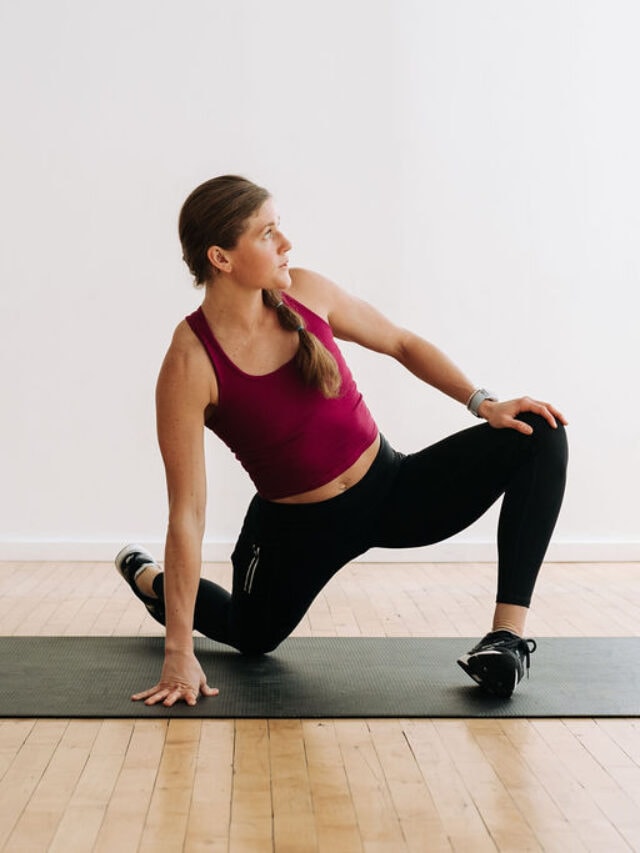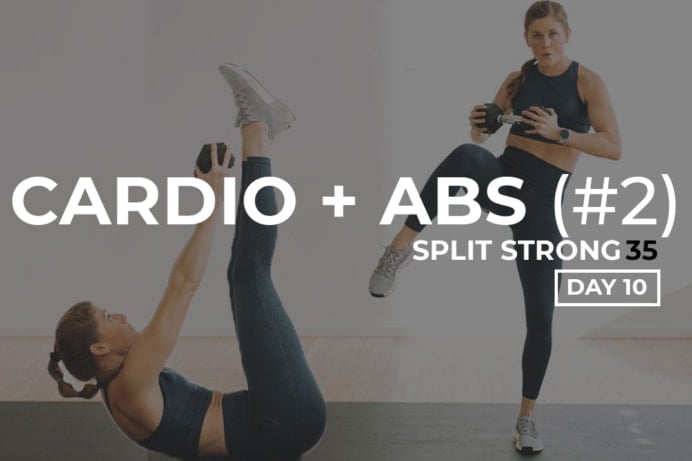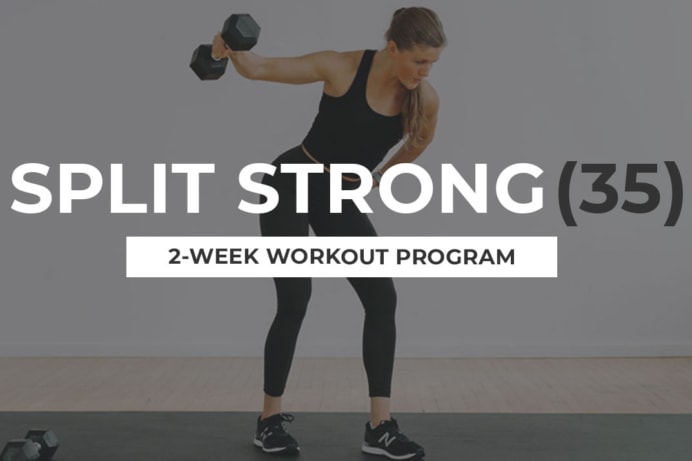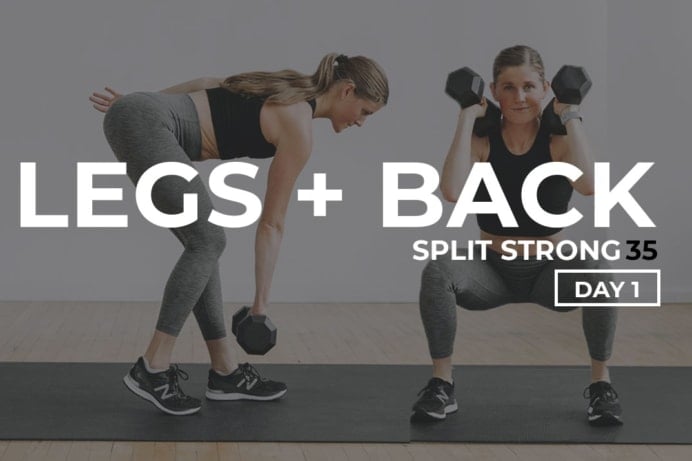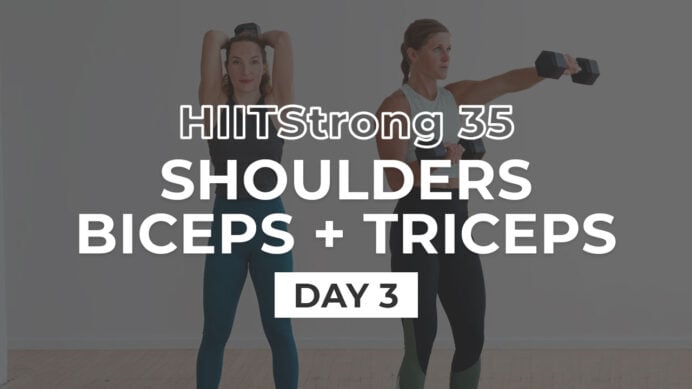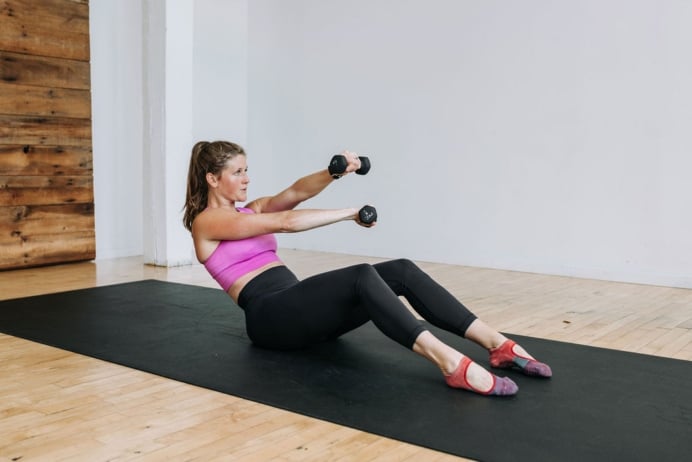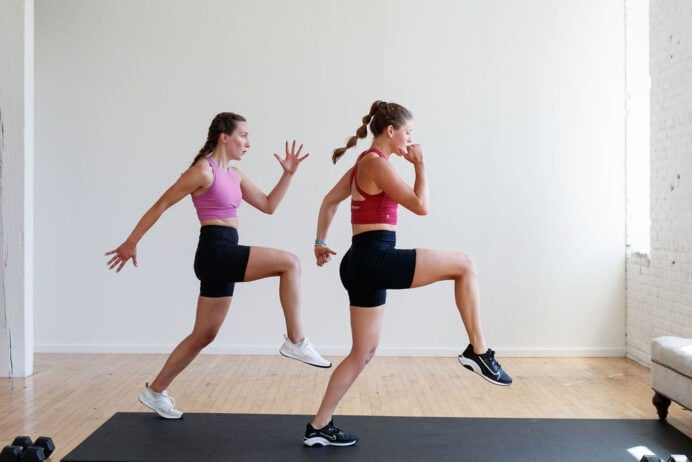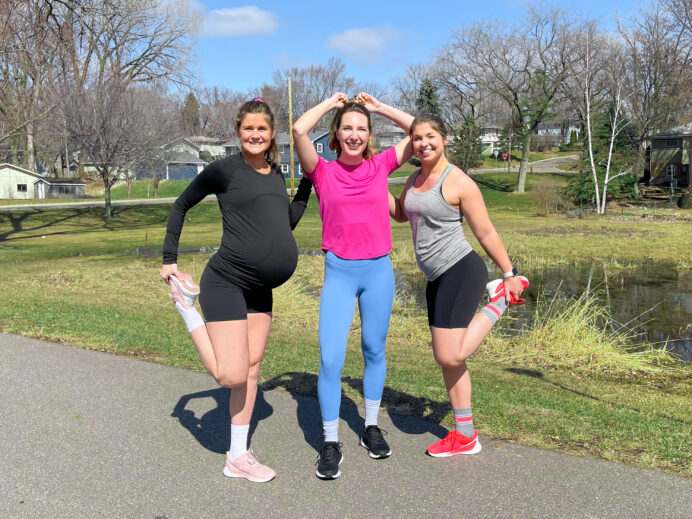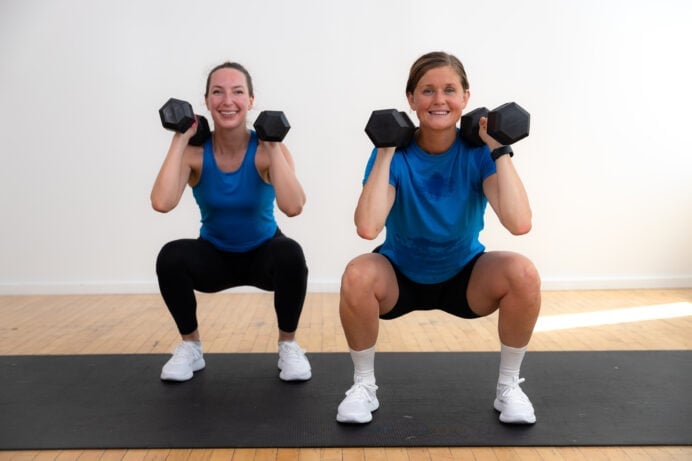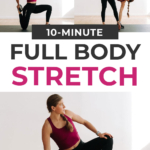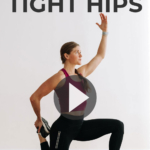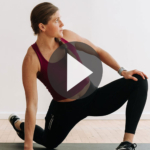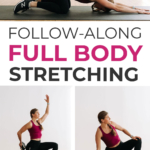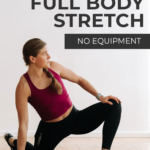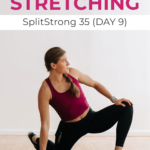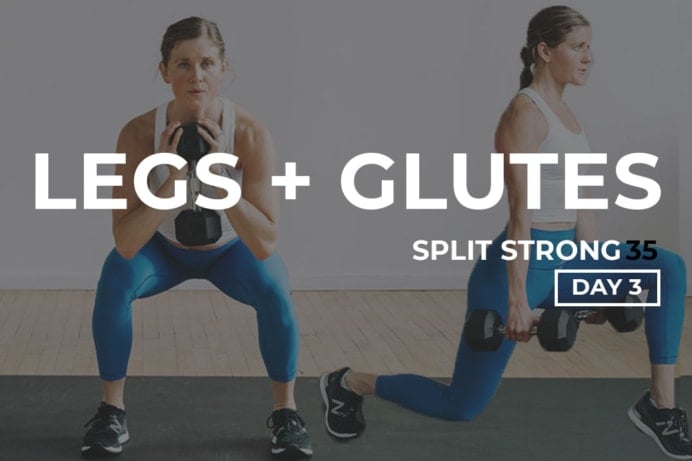
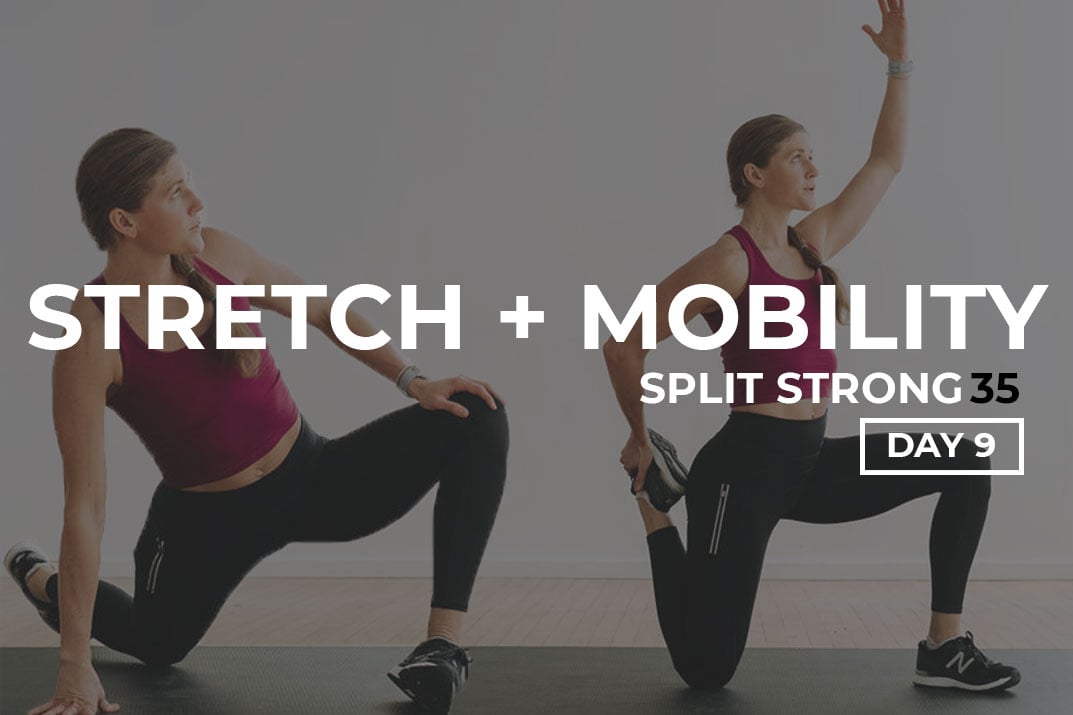
10-Minute Dynamic Stretching + Mobility Workout (SplitStrong 35, DAY 9)
Support muscle recovery, increase flexibility and mobility, and prevent injury with this guided, 10-minute dynamic stretching and mobility workout.
This is DAY 9 of our SplitStrong 35 Workout Program.
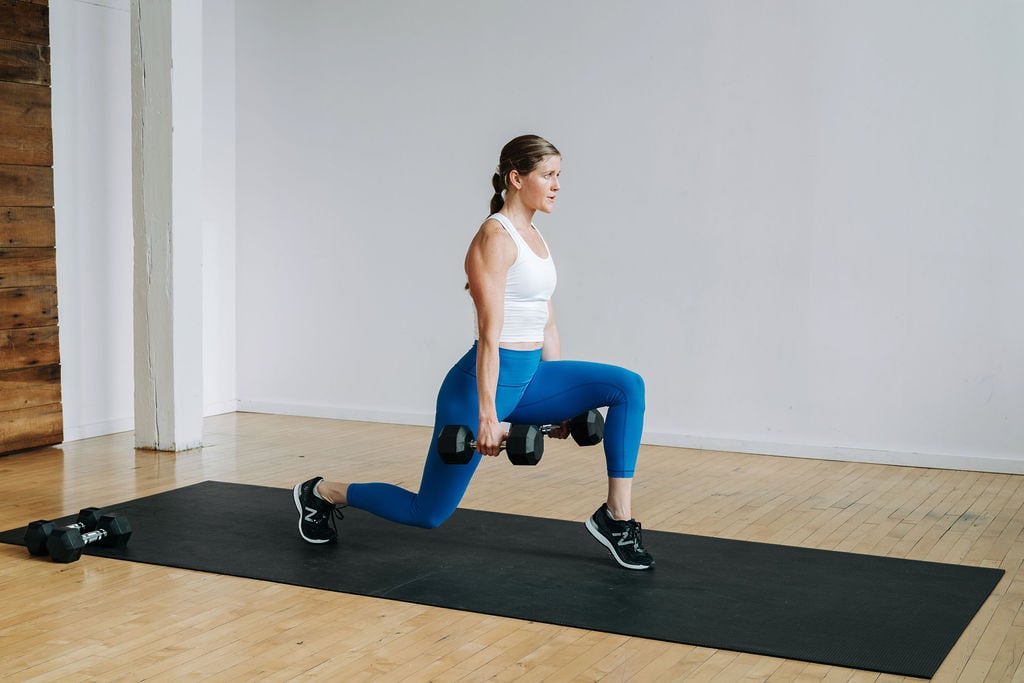
LET’S GET STARTED
Download Your FREE SplitStrong Workout Plan
One of the most common comments we’ve received on the SplitStrong 35 Workout Program is that you love the dynamic warm up stretches and cool down routines included in the daily workout videos.
Dynamic stretching and muscle recovery is an essential part of a well rounded fitness routine.
Pushing yourself in tough workouts is rewarding — but supporting your body in muscle recovery is JUST as important! Which is why we’ve built these dynamic stretching routines into this SplitStrong Program.
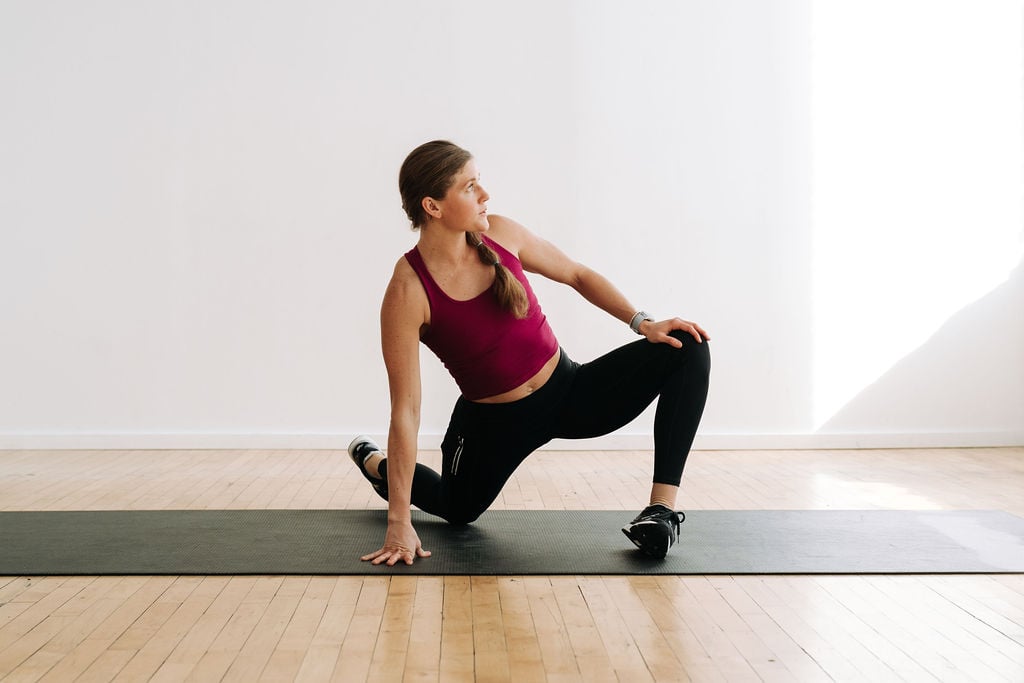
Dynamic Stretching FAQs
Dynamic stretching simply means stretches that include active movement or energy. Or moving your muscles and joints through their full range of motion. Static types of stretches are those where you stand, sit or lie still and hold a stretch for a period of time.
Dynamic stretching routines have several benefits, including: warming up muscles; improving speed, agility and acceleration; taking muscles and joints through their full range of motion to reduce muscle stiffness and increase mobility and flexibility; and decreasing risk of injury.
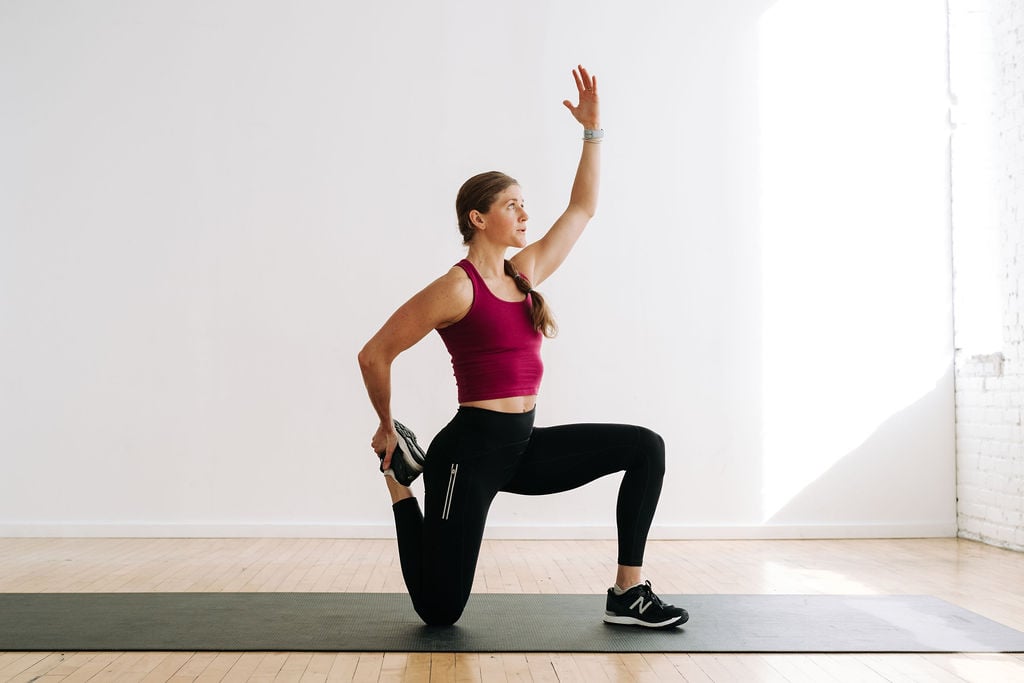
10-Minute Dynamic Stretching and Mobility Workout (SplitStrong 35, Day 9)
Relieve sore and stiff muscles, increase muscle length and range of motion, and reduce risk of injury with this guided dynamic stretching routine.
Use this as a warm up routine before a run or at home workout. Or as a stand alone 10-minute stretch throughout your day.
These 10 dynamic stretches are great for runners and fitness enthusiasts of all levels.
Prefer longer workouts? Repeat this mobility routine twice or add this stretching workout onto a walk, run or cardio activity of choice.
Workout Equipment:
No equipment needed for this dynamic stretching routine; bodyweight only.
Shop My Extra-Large Yoga Mat
DISCOUNT CODE: NourishMoveLove

Workout Instructions:
Follow along with the guided Dynamic Stretching Workout on YouTube, led by certified personal trainer, Lindsey Bomgren.
Your Workout Looks Like This:
- Move from one dynamic stretching pose to the next
- Hold each stretch for 30-60 seconds
- A general outline is: standing stretches, low lunge and hip opening stretches (great stretches for runners), hamstring stretches, kneeling, glute and hip stretches, table top and low back stretches, dynamic cardio stretch, upper body, shoulder and neck stretches
Workout Outline
We’ll move from one stretch to the next, but here’s a general outline of what to expect:
1. Low Lunge Stretch and Spinal Rotation (Groiner Stretch)
2. Half Kneeling Hip Opener
3. Hip Rocks with Leg Extended
4. Hamstring Stretches (Pyramid Pose)
5. Child’s Pose and Plank Launcher

Prefer to Watch On YouTube?
5 Dynamic Stretches for Runners
Low Lunge Stretch and Spinal Rotation (Groiner Stretch)
Stretches: Hips, hip flexors, glutes, back, chest and shoulders.
Benefits: A great warmup exercise and dynamic stretch for runners to do daily.
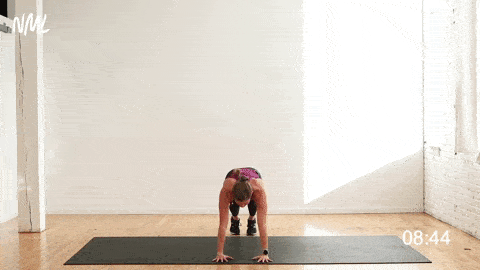
How To Do A Low Lunge Stretch (Groiner Stretch)
- Begin in a high plank position or at the top of a push up position. Hands on the mat, shoulders stacked over wrists, core engaged, creating a straight line from your head to your heels.
- Exhale as you step your left foot outside of your left hand, planting it on the mat.
- Grounding through your right hand, open up towards your left, reaching your left hand up towards the ceiling. Gaze follows fingertips. Option to slightly move your hips side to side and roll out the left wrist while you hold this Groiner stretch.
- Return your left hand to the mat, then step back to high plank.
- Switch sides, stepping your right foot outside your right hand.
- Repeat for 30-60 seconds, switching sides each time.
Half Kneeling Hip Opener Stretch
Stretches: Hips, hip flexors, inner thighs, calf and ankle mobility.
Benefits: One of the best hip opener stretches to help with mobility at the front of the pelvis which improves posture and aligning your hips. A great way to increase the power of your hips and improve low back pain.
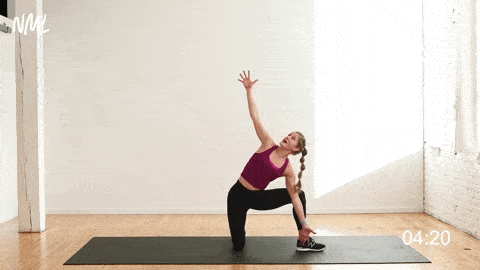
How To Do A Half Kneeling Hip Opener Stretch
- Start kneeling, both knees on the ground, shoulders stacked over hips and knees.
- Step your right foot forward into a half kneeling position (kneeling on left knee).
- Guide your right leg towards the right side of your body, to a 45-degree angle or if possible to a 90-degree angle so your right hips is in line with your right knee.
- Guide your right hand down your right leg, striving for fingertips to meet right ankle or ground (palm out). Simultaneously, extend your left hand straight overhead. Think of it as a kneeling triangle pose.
- Hold this position, or rock up and down for 30-60 seconds.
- Switch sides and repeat on left side of the body.
Low Lunge Hamstring Stretch (Dynamic Pyramid Pose)
Stretches: Hamstrings, glutes, calves, ankles and low back.
Benefits: Hamstring stretches can increase flexibility and improve the range of motion in the hips to help you perform daily tasks (such as walking up stairs and bending over — with ease and injury free). Tight hamstrings can negatively impact surrounding muscles, specifically causing low back pain.
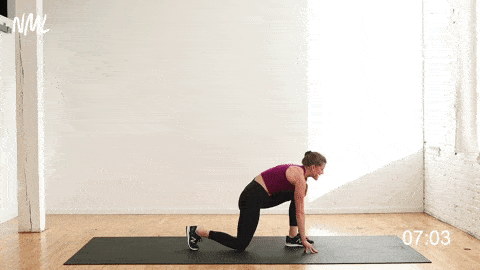
How To Do A Low Lunge Hamstring Stretch (Pyramid Pose)
- Start in a lunge position, right foot forward, left foot back. Dropping your back left knee towards the mat, aiming for a 90-degree angle in both knees. Frame your front foot with your hands.
- Press through your front right heel as you straighten your back leg, feeling a stretch along the back of your legs. Specifically stretching your front right leg hamstring. Note, only stretch until there is mild to moderate tension on the back of the leg (hamstrings). Flexibility will improve over time.
- Then, lower your left knee to the ground, returning to a low lunge position. Repeat this low lunge and return to standing movement for 30-60 seconds.
- Switch sides and repeat on the left leg.
Single Leg Adductor Hip Rocks
Stretches: Legs, hips, hip flexors and adductors (inner thighs).
Benefits: This half kneeling dynamic adductor mobility exercise is a great way to prevent pubic symphysis pain during pregnancy.
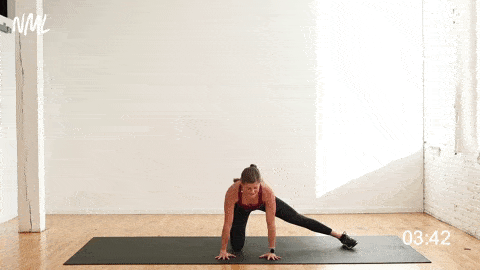
How To Do Half Kneeling Hip Rocks
- Start in tabletop position or quadruped position, on your hands and knees, hips stacked over knees and shoulders stacked over hands.
- Extend your right leg out to the side, resting the inside edge of your right foot on the mat. Keep your hands planted on the mat.
- Slowly and gently “rock” your hips back a few inches and forward a few inches, breathing through any tightness. Bringing your butt to the heel of your bent knee.
- Then rock forward to return to the starting position.
- Repeat for 30-60 seconds, then repeat on the left side.
Child’s Pose to High Plank
Stretches: Low back, inner thighs and hip muscles.
Benefits: Child’s pose is a great beginner stretch that relieves stress, calms the brain, eases lower back pain, increases circulation and opens the hips and thighs. Adding a launch into high plank makes this static stretch a dynamic stretch that engages the core and lengthens the muscles from head to toe.
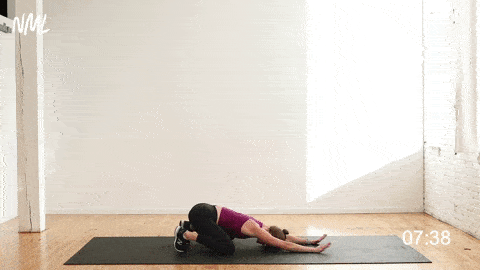
How To Do Child’s Pose Stretch Into High Plank
- Start in high plank position, shoulders stacked over wrists, core engaged, pulling up on your kneecaps to engage your quads. Creating a straight line from head to toes.
- Drop your knees to the mat and shift your weight back. Pushing your hips back towards your heels to sit back into child’s pose. Keeping your arms extended out away from your body as you drop your forehead to the mat.
- Take a big inhale in child’s pose.
- On your exhale, push your body forward, returning to the starting position, high plank.
SplitStrong 35 Free 2-Week Workout Program
A 2-week, FULL BODY workout plan with new workout videos DAILY — a 5 day workout split, 35-minutes a day, 5-days a week.
If you liked this dynamic stretching and mobility workout (day nine of the SplitStrong 35 workout plan); download the full training plan.
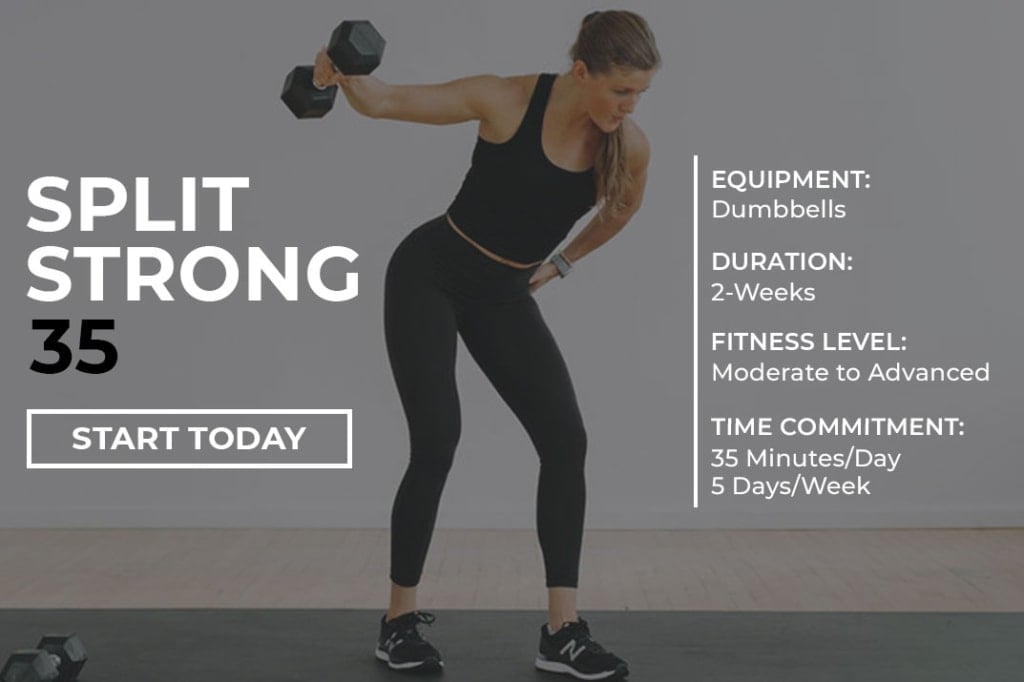
Up Next:
See AllPin this Workout:
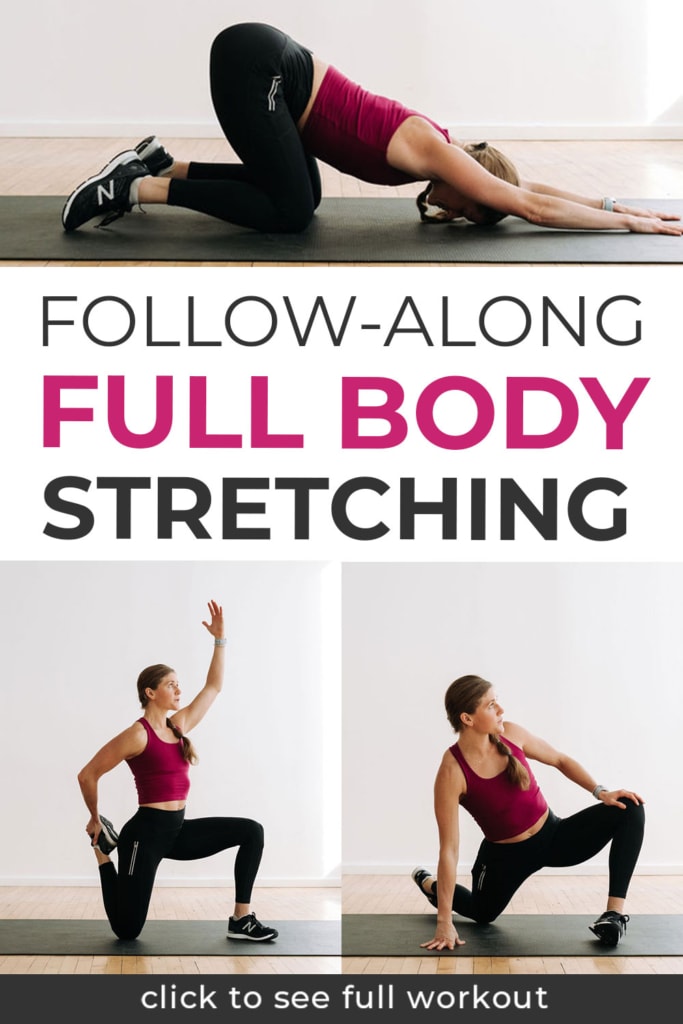
More At Home Stretching Routines:
- 10-Minute Full Body Stretch (for low back pain and tight hips)
- 10-Minute Morning Stretch Routine (Foam Roll + Stretch)
- 8 Best Upper Body Stretches for the Neck, Back and Shoulders
- 10-Minute Dynamic Warm Up: Cardio + Mobility
- 10-Minute Recovery Yoga
This post includes affiliate links. I do earn a commission for products purchased using these links (at no additional cost to you). Thank you for supporting Nourish Move Love, making the content you see on this blog possible.










